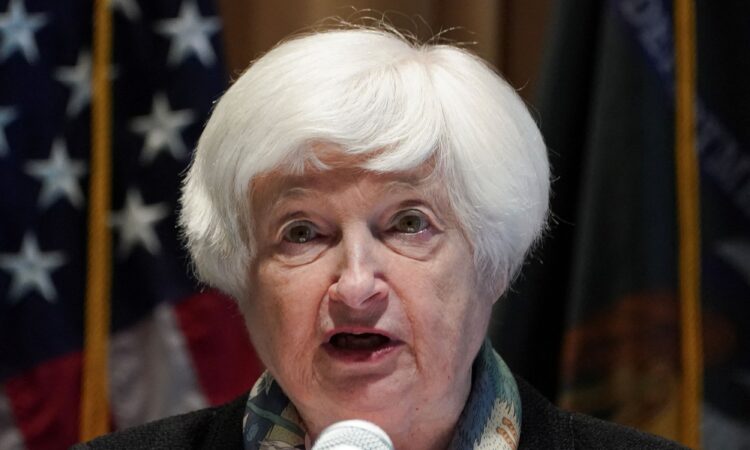
U.S. Treasury Secretary Janet Yellen outlines the improvements the IRS will deliver to taxpayers in 2024, during remarks at IRS Headquarters in Washington, U.S., November 7, 2023. REUTERS/Kevin Lamarque
Kevin Lamarque | Reuters
U.S. Treasury Secretary Janet Yellen underscored her priorities aimed at stabilizing frigid ties between the United States and China late Thursday.
Yellen, in prepared remarks for a dinner hosted by the U.S.-China Business Council, said “continuing to stabilize our relationship to prevent escalation won’t make news. But our economies, our people — and, again, also economies and people around the world — will be safer and more secure.”
“This is what it means for the U.S. and China to build and responsibly manage our relationship,” she said, adding that she has plans to visit China for a second time as Treasury Secretary. She first visited China as Treasury Secretary in July.
Yellen acknowledged that the two countries “strongly disagree” on many areas and there are “risks of shocks” that could impact both.
Relations between the world’s two largest economies have been watched closely for any signs of improvements since China’s President Xi Jinping and U.S. President Joe Biden met last month on the sidelines of the Asia Pacific Economic Cooperation leaders’ meeting in San Francisco.
Both parties agreed at that time to keep a lid on tensions between the world’s top two economies next year, as they shifted focus to domestic challenges.
Yellen on Thursday highlighted the United States’ plans to keep pressing Beijing on its economic policies and policymaking, noting that China is now nearly 20% of the global economy and its economic decisions have far-reaching consequences.
“Understanding China’s plans, especially how China intends to respond to challenges with local government debt and the real estate market or how it might react if unexpected weaknesses in its economy should arise, is crucial for those of us charged with policymaking in the United States,” she said.
China has injected a slew of policy support into its economy, which so far has not done enough to lift economic sentiment, as post-Covid recovery of the world’s second-largest economy has fallen short of expectations.
The country has been plagued by a festering real estate crisis, debt risks and chronic youth unemployment.
More recently, ratings agency Moody’s downgraded its outlook on China’s government credit ratings to negative from stable, expecting Beijing’s support and possible bailouts for distressed local governments and state-owned enterprises to diminish China’s fiscal, economic and institutional strength.
Yellen said boosting collaboration between the two countries was a priority, especially in areas pertaining to climate change.
Washington and Beijing are already exchanging information about modeling climate stress scenarios, a step Yellen said was important to preparing for the threat climate change poses to financial systems.
She pointed to efforts being taken to handle climate stresses, which is “crucial to understanding and preparing ourselves for the threat climate change poses to our financial systems.”
Yellen noted there was scope for the U.S. to collaborate with China on anti-money laundering and to counter the financing of terrorism, including addressing illicit finance risks associated with cryptocurrency.






